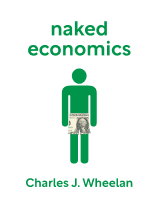

This article is an excerpt from the Shortform book guide to "Naked Economics" by Charles J. Wheelan. Shortform has the world's best summaries and analyses of books you should be reading.
Like this article? Sign up for a free trial here .
Why do governments intervene in markets? Is government intervention good for an economy?
When there is a market failure of some sort, governments often intervene to restore the economic system. However, if the government sets too many rules, or gets too involved in managing economic operations, it can destroy an economy.
In this article, we’ll discuss three possible downsides of government intervention: 1) misallocation of resources, 2) rising costs due to regulations, 3) stifled growth, and 4) distorted incentives due to taxes.
1. Governments Can Misdirect Resources
One major way that a government can steer an economy wrong is by misdirecting resources. While a market directs resources according to where market demand indicates they’re needed, a government directs resources according to how individuals in power want them to be directed. These individuals often have motives that don’t align with the movies of the rest of society.
For example, in the early 1990s, the federal government funded the building of a high-speed particle accelerator. The best building spot for the accelerator would have been Illinois, which already had much of the necessary scientific infrastructure built because of previous projects. However, the government chose to locate the accelerator in Texas, not for practical reasons but because the President at the time, George W. Bush, hailed from Texas and wanted the prestigious project built there. Because there was no existing infrastructure or expertise in that area, the price of the project skyrocketed and work was ultimately halted—after the government had spent over $1 billion on it.
When governments direct resources to pet projects because of a personal preference, taxpayers lose in two ways:
- Tax money is wasted on projects that eventually go bust because they weren’t sound.
- Taxes are tied up in less valuable projects instead of being spent on projects that could improve society: money for entrepreneurs, loans for students, and so on.
2. Regulations Can Raise Costs
Governments can also interfere with an economy’s operations by implementing too many regulations. Regulations are a subtle way of directing resources and money, and they can raise the cost of doing business in various ways—for example, through excessive licensing requirements or paperwork. When businesses incur extra costs because of regulations, they typically raise their prices, making goods and services more expensive for consumers.
For example, regulations ensure that lawyers are well-educated, so that consumers can be sure to hire qualified legal help. To a degree, this is a good thing for consumers, because it protects them from unqualified lawyers. However, the educational standards for lawyers are exorbitant, requiring many years of school and ongoing certifications, and are not necessary for the majority of legal work that many consumers need advice on—much legal work is simple paper-filing, not complicated prosecutions. As a result, lawyers are very expensive, and sometimes consumers can’t afford them. Consumers would be better off if they were allowed to choose between lawyers of differing levels of credentials.
3. Regulations Can Stifle Growth
Regulations can also stifle growth by propping up specific industries. They are often used by certain industries to protect their incumbents. Such incumbents are called special interest groups: groups that influence governmental policies. Special interest groups promise politicians votes in return for policies that benefit them, but that don’t necessarily benefit the rest of the economy. An example would be corn farmers, who pressure politicians into imposing corn-sourced ethanol requirements in gasoline, purportedly because ethanol makes gas more environmentally friendly. Even though the scientific evidence for the benefits of ethanol is scant, politicians continue to promise ethanol regulations and ethanol subsidies because farmers make up a powerful voting block.
Regulations supported by special interests have a number of negative effects on an economy:
1. They prop up industries that couldn’t otherwise sustain themselves (like the ethanol industry detailed above).
2. They waste taxpayer money on projects that don’t benefit most taxpayers (such as funds for local museums paid for by federal dollars).
3. They erect barriers to people trying to enter an industry, which makes it harder for qualified people to offer their services. For example, the training and certification regulations for teachers haven’t been shown to raise teacher performance, but do serve to protect existing teachers from competition. In fact, most new certification laws that are introduced exempt existing teachers—if such laws were truly necessary for the benefit of students, all teachers should be subjected to them.
4. They raise prices for consumers, without providing additional benefits. For example, in many states, people wishing to become manicurists have to complete stringent licensing requirements, not because consumers regularly get injured from pedicures, but because existing nail salons want protection from incoming immigrants offering cheaper prices. Such regulations deliver few benefits to consumers but allow existing salons to keep their prices high.
5. They prevent creative destruction, which is when markets destroy an existing system when creating a new one. For example, the rise of streaming services destroyed the business model of retail video-rental stores. Creative destruction is a natural part of an economy, and regulations that prevent it by protecting industries from being destroyed or altered also prevent companies from innovating in ways that benefit consumers.
4. Taxes Can Distort Incentives
Taxes are an important source of income for a government, enabling it to provide the services needed to run an economy. However, if taxes are not well-designed, they can harm an economy by distorting people’s incentives in a number of ways:
1. In order to avoid taxes, rich people often try to exploit tax code loopholes, moving their money to different investments or even to a different location—states or countries—with laxer tax laws. Tax avoidance acts as a drag on productivity in an economy, since it directs business activity away from productive pursuits and instead toward tax evasion. This type of activity also exacerbates inequality because in general, only rich people can afford accountants who can exploit the tax code.
2. By taxing income, a government essentially punishes work, which can discourage people from working. The effects of this can be seen when married couples are lumped together under the same tax bracket: The earner who pulls in less income will end up paying a much higher tax rate than she would pay by herself, making her efforts significantly less effective. Since these second earners are typically women, such taxes discourage women from staying in the workforce. This can have a tangible effect on workforce participation; after the 1986 tax reforms addressed this issue in the U.S., women’s participation in the workforce increased threefold.
3. If tax rates get so high that the people being taxed feel they’re unfairly treated, they’ll create a black market to conduct their business. This can be a real problem in some high-tax countries; for example, experts estimate that a shadow economy in Norway expanded from 1.5 percent of gross national product in 1960 to 18 percent of it by the end of the 20th century. Further, when people drop out of the official economy and stop paying taxes, everyone else’s taxes rise, which then encourages more people to move into the black market, and it becomes a downward spiral.
How Much Is Too Much Taxation?
Some economists argue that since taxes punish work (as well as discourage investment by taking away some of the future returns of a firm investing in a business), they should be reduced to almost zero. These economists argue that such tax cuts would encourage such economic growth that they would pay for themselves, because the smaller taxes recouped from the increased economic growth would more than equal the larger taxes taken from smaller economic growth.
Unfortunately, this belief is based on a misunderstanding. It’s true that cutting taxes and rolling back regulation can encourage productivity, but such cuts will only pay for themselves if they’re swinging the tax rates from one extreme to another. For example, if tax rates are set at 95 percent income, that economy is probably slow-growing (such high rates remove almost all incentives to work hard or invest in businesses). If those taxes get reduced to 5 percent, that economy is likely to take off to such an extreme that the government will end up raking in much higher revenues.
However, in a country like the United States, where tax rates are relatively low—and certainly lower than many other developed countries—a further tax cut isn’t going to pay for itself. Instead, it will simply deprive the government of revenue that it could use to keep the economy running smoothly, defend the nation, educate children, and so on.
Therefore, the answer to how much the tax rate should be falls somewhere in the middle of two extremes, leaving the door open to debate.
There’s No Optimal Tax
Unfortunately, examining all the pros and cons of various methods of taxation does not produce the ideal tax that will effectively encourage the right kind of actions all the time. Different approaches will always result in conflicting incentives for different facets of the market, and will always prioritize a solution to one problem over another.
For instance, the problem of rich people cheating the tax code could be solved if a government used a flat tax instead of a progressive tax. A flat tax sets one rate that affects everyone equally, while a progressive tax takes a larger percentage of rich people’s incomes than poor people’s (which is why rich people try to manipulate their incomes through creative accounting).
However, a flat tax (also called a regressive tax) has its own drawback: It falls harder on poor people than on rich people. For example, at a flat tax rate of 25 percent, a person earning $40,000 a year has to pay $10,000 while a person making $400,000 has to pay $100,000. It’s much harder for the poorer person to live on her resulting net income of $30,000 than it is for the richer person to live on her net income of $300,000.
There are also negatives to using taxes to incentivize good behavior or to manage externalities. For example, taxing large cars might encourage people to buy smaller cars, but it carries its own sets of unfair consequences:
- Taxes favor the rich: When certain behaviors or items become more expensive, poorer people are priced out of them. This might lead to situations where, for example, a high tax on gas allows investment bankers to drive Hummers but makes it hard for construction workers to drive their pickup trucks, which they need for work.
- Taxes are hard to get right: There are endless policy debates about how high taxes should be on various items, because each option carries with it its own set of conflicting incentives. Set taxes too low, and bad behavior isn’t curbed, but set them too high and you’ll create new problems—like the black markets we discussed earlier.
How Much Is too Much?
It can be hard to know where to draw the line between too little and too much governmental involvement, but a good place to start is with this guideline: Governments should never provide goods or services unless there is a compelling reason to do so. In general, a government should act as a provider of last resort for any goods or services, allowing the private sector to provide these things instead whenever possible.
This is because a government is a monopoly, meaning it has no competition (at least, within its own country). Monopolies are generally bad for an economy because they lead to inefficiencies: If you have guaranteed customers, you have few incentives to work hard to attract or keep those customers.
However, there are some situations in which a monopoly is a better option for a particular good or service—for example, if competition might lead to decreased quality as firms compete for customers on price. For this reason, agencies dedicated to public health or safety, such as the Department of Motor Vehicles, should stay in the hands of the government; if private companies were to issue driver’s licenses to less-safe drivers in order to get their business, unsafe drivers on the roads would harm society as a whole.
Another reason justifying governmental monopoly is if it provides a service that private firms would not be able to because of logistics, technology, or profits. In America’s early days, this justified the government providing a postal service—no private firm had the delivery infrastructure to reach every corner of the country, nor the incentive to do so, as delivering to remote, rural areas wasn’t profitable. However, today, private firms such as FedEx and UPS have proven that these issues are no longer problems, and the postal service no longer needs to be a governmental provision.
One way a government can combine the oversight of a monopoly with the efficiency of the private market is to act as a mediator; it can oversee government programs but hand the operation of those programs over to private firms. Done well, this can allow for the best of both worlds—the government can keep an eye on quality, while firms can compete on price and efficiency in order to win governmental contracts. This is the way that many roads are built: Governments field bids and assign the work to the company best positioned to complete the work properly.

———End of Preview———
Like what you just read? Read the rest of the world's best book summary and analysis of Charles J. Wheelan's "Naked Economics" at Shortform .
Here's what you'll find in our full Naked Economics summary :
- An explanation of economics that anyone can understand
- How governments and firms can use incentives to foster a healthy economy
- How and why people behave in certain ways






